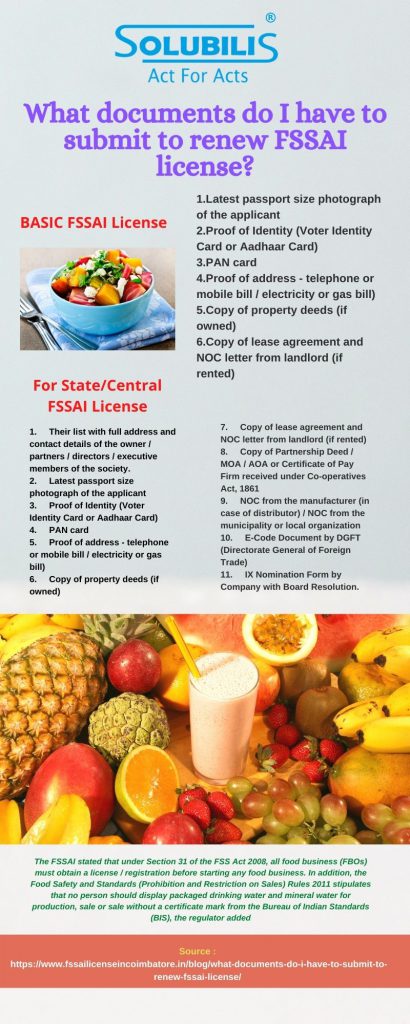
What documents do I have to submit to renew FSSAI license?
April 2, 2021
TALK TO EXPERTS
The Food Safety and Standards Authority of India (FSSAI) is a health institution established under the Ministry of Health and Family Welfare, Government of India. FSSAI license has been established under the Food Safety and Standards Act, 2006, which is the unified law governing food safety and regulation in India. The FSSAI is responsible for protecting and promoting public health through the regulation and monitoring of food safety. The FSSAI is chaired by a non-executive chairman, who is appointed by the central government, or is not below the rank of secretary to the government of India.
The validity of FSSAI license is from 1 to 5 years and it depends on the number of years selected by the food operator. The cost of the license increases along with the number of years applied. Thus, according to the FSSAI guidelines, you will need to apply for a license renewal within 30 days of the expiration of the current license.
Types of FSSAI License
In India, FSSAI issues the following three types of licenses:
- Central License
- State license
- Basic registration
Central License – This license is for FBOs with an annual turnover of Rs. 20 crores. It is issued for 5 years and for at least 1 year.
State License – The annual turnover in the business is Rs. 12 lakhs. Licensed for 5 years and minimum 1 year.
Basic registration – The Company’s annual turnover is Rs. 12 lakhs. Licensing for a period of 5 years and a minimum of 1 year.
Documents required for Basic FSSAI / Food License
- Latest passport size photograph of the applicant
- Proof of Identity (Voter Identity Card or Aadhaar Card)
- PAN card
- Proof of address – telephone or mobile bill / electricity or gas bill)
- Copy of property deeds (if owned)
- Also Copy of lease agreement and NOC letter from landlord (if rented)
Documents for State or Central Food / FSSAI License
- Their list with full address and contact details of the owner / partners / directors / executive members of the society.
- Latest passport size photograph of the applicant
- Proof of Identity (Voter Identity Card or Aadhaar Card)
- PAN card
- Also a Proof of address – telephone or mobile bill / electricity or gas bill)
- Copy of property deeds (if owned)
- A Copy of lease agreement and NOC letter from landlord (if rented)
- Copy of Partnership Deed / MOA / AOA or Certificate of Pay Firm received under Co-operatives Act, 1861
- NOC from the manufacturer (in case of distributor) / NOC from the municipality or local organization
- E-Code Document by DGFT (Directorate General of Foreign Trade)
- IX Nomination Form by Company with Board Resolution.
Procedure for license renewal
Form A / Form B Filling: Form A or Form B is thus required to be filled depending on the eligibility of the food operator. These are the basic forms of business activities of a food operator that need to be filled out with a self-certified declaration that you must comply with the guidelines of the Food Safety and Standards Act. Photo identity proof like Aadhaar card, driving license, voter identity card, passport etc. is also required to be attached.
Verification: Upon receipt of your application, the authorities will examine it and may also arrange an inspection at your business premises to ensure that you have disclosed all information and that it has been properly submitted.
Completeness: After successful inspection of your business proceedings, if they are satisfied, they license in your favor.
Getting a License: Then the license should not take more than 60 days to reach you. If more than 60 days have passed and you have not received the license, then you can resume your business without waiting for any notification. Getting a food license renewal is very easy.
What is FSSA act and why it is needed?
The Food Safety and Security Act 2006 is an act and the FSSAI was established to determine the standards of food products on the basis of science and regulate their production, storage, distribution, sale and import. Its main purpose was to maintain a certain standard of food quality and to control adulteration and quality in food. The Food Safety and Standards Authority of India is responsible for the implementation and enforcement of the FSSA, 2006, with the help of the State Food Authorities.
Benefits of FSSAI License
Business expansion:
They can expand their business to other cities and states without much confusion;
Consumer Awareness:
They can bring consumer awareness because, nowadays, consumers have become very smart to decide what is good for them and what is not. Consumers, now, tend more towards the quality of food than its price. A product with the FSSAI logo attracts customers.
Legal Advantages:
One, with a food license, no need to worry about legal difficulties or fines or penalties. Those who do not register with FSSAI may be subject to fines and penalties.
Permission to use the FSSAI logo:
Once food license is obtained, one can use the FSSAI logo on the package and get more customers.
Latest news

On Friday, food regulator FSSAI made it mandatory for packaged drinking water and mineral water producers to obtain a license from the authority or obtain a BIS certificate for registration.
In a letter to the Food Safety Commissioners of all the States and Union Territories, the Food Safety and Standards Authority of India (FSSAI) has given this directive, which will come into effect from April 1, 2021.
The FSSAI stated that under Section 31 of the FSS Act 2008, all food business (FBOs) must obtain a license / registration before starting any food business. In addition, the Food Safety and Standards (Prohibition and Restriction on Sales) Rules 2011 stipulates that no person should display packaged drinking water and mineral water for production, sale or sale without a certificate mark from the Bureau of Indian Standards (BIS), the regulator added.


